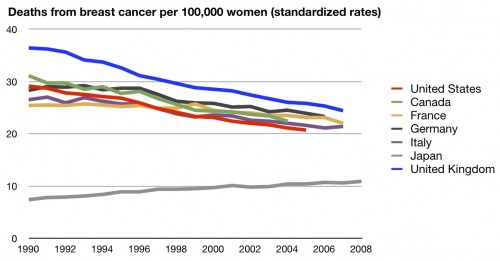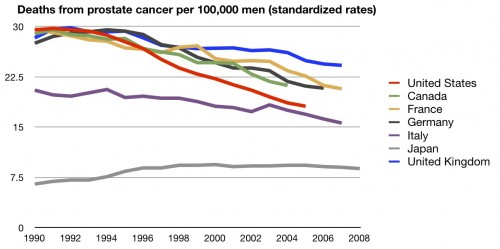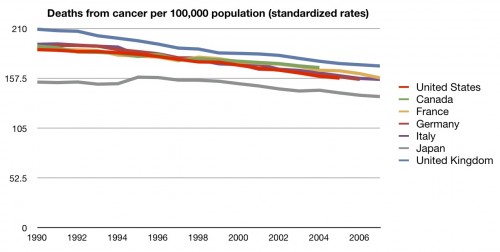Need a break from thinking about the two Scotts or what kind of toilet paper should grace your bathroom? (Answer, not Quilted Northern, instead try Scott . . . . . Aargh!)
Along comes Paul Krugman, Nobel Prize winning economist and NY Times OP Ed writer to discuss the seeming simplicity of Wisconsin's junior Senator, Ron Johnson. Johnson wrote an Op Ed piece in today's Wall Street Journal slamming the Patient Protection and Affordable Care Act on its one year anniversary. (Johnson is agin it, and he calls it . . . wait, . . . wait, . . .that's right, ObamaCare.)
Money Quotes:
Along the way he [Senator Johnson] commits some of the classic howlers, like the one about how you can see how bad single-payer insurance is by the fact that Americans don’t have to wait as long as Canadians for hip replacements, which in Canada are paid for by the government, while in America they’re mainly paid for by … Medicare.
But what struck me about the whole piece was the assumption that modern medicine in general is something only we lucky free-market Americans have, while in Europe they’re still using leeches or something. In other words, it’s part of the superiority complex you often encounter in U.S. politics; people just know that we’re the best, and won’t believe you when you tell them that actually they have the Internet, cell phones, and antibiotics in Europe too.Krugman, links to a more detailed analysis of Ron Johnson's criticism by Dr. Aaron Carroll, who co-authors a popular health care policy blog called The Incidental Economist. Dr. Carroll is is an associate professor of Pediatrics and the associate director of Children's Health Services Research at Indiana University School of Medicine. He is also the director of the Center for Health Policy and Professionalism Research at Indiana University. Here are the key points made by Dr. Carroll:
The WSJ took the opportunity to print a piece by Senator Ron Johnson, on the health care his daughter Carey received at birth, and how he is so thankful that the US system was not under the PPACA at the time.
Let me start by saying I’m thrilled Carey received top-notch care and that she’s doing well. I wouldn’t have it any other way. I wish the same for all children who need it. But let’s be clear. She received that care in part because she had insurance, and getting more people insurance is the whole point of the PPACA.
The arguments Senator Johnson makes are numerous. So I want to take them one at a time.
The procedure that saved her, and has given her a chance at a full life, was available because America has a free-market system that has advanced medicine at a phenomenal pace.
So much wrong here. First of all, maybe you can make an argument that the free market system of drugs or devices helped here. But the “free market” insurance system? Name me a single procedure developed by an insurance system. We’ve had a single payer system covering everyone over 65 for decades and there have been plenty of improvements in care for the elderly.
I don’t even want to think what might have happened if she had been born at a time and place where government defined the limits for most insurance policies and set precedents on what would be covered. Would the life-saving procedures that saved her have been deemed cost-effective by policy makers deciding where to spend increasingly scarce tax dollars?
Those definitions the government is setting are all being attacked by many governors for being too high. The definitions are setting minimums, not what should not be covered. Nothing at all prevents private insurance companies from creating policies that cover anything, as long as they cover the minimum. Senator Johnson has this completely backwards.
Compared to the U.S., breast cancer mortality is 9% higher in Canada (according to the government statistics of each country), 52% higher in Germany and 88% higher in the United Kingdom (according to studies published in Lancet Oncology). Prostate cancer mortality is 604% higher in Britain.
I’d like to see his data. Here’s what I have. First breast cancer:
Here’s prostate cancer:
Yes, we do better than a lot of countries in preventing mortality from those cancers. But we’re not the best, and the differences don’t appear to be nearly as large as Senator Johnson says. Moreover, he’s cherry-picking. We’re great at treating those cancers. But here’s overall mortality from cancer:
That’s a much tighter clustering of results. And again – I don’t dispute that we may do some things better here. But to give the credit to our insurance system and claim that the PPACA will change that? Where’s the proof?
Those in need of timely care from specialists are better off in the U.S. Drawing on several peer-reviewed studies, Dr. Scott Atlas of the Stanford University Medical Center notes that patients who need knee and hip replacement, cataract surgery, and radiation treatment wait months longer in the United Kingdom and Canada than in the United States.
Senator Johnson makes a classic mistake here. Who needs the most hip replacements and cataract surgeries in the US? The elderly. How do the elderly get their care financed? Medicare. What is Medicare? A single-payer system. Surely Senator Johnson is not advocating that we should give everyone Medicare because it outperforms Canada and the UK, is he?
Our health-care system has problems that must be addressed. But ObamaCare will make those problems much worse. Instead of increasing consumer choice, it narrows it.
For those who have private insurance through their employers, nothing has changed. For those with Medicare and Medicaid, nothing has changed. For many of the uninsured, they will get Medicaid or have choices in the exchange. We can quibble about some anecdotes, but those are the broad brush strokes.
Instead of encouraging innovation, it stifles creativity. Instead of expanding access to care, it will ration it. And instead of allowing competition to help bring down costs, it increases spending and puts our health-care system on a path to ruin.
Most of the companies and people doing the innovation supported the law. They haven’t made any complaints about creativity. No one is rationing as Senator Johnson suggests, regardless of the rhetoric. And while I agree that it increased spending and doesn’t contain costs enough, the PPACA does more to contain costs than any other laws passed in quite some time.
Moreover, Senator Johnson seems to be under the illusion that no government money or insurance is in the system now. Did the hospital where Carey got her miraculous surgery accept Medicaid? Did it accept Medicare? Did it have any federal funding? Was it an academic medical center? Were residents involved in her care? Did it accept NIH grants? Was the procedure or care delivered developed by people who accepted those grants?
I ask, because all of those are ways in which the federal government contributes to health care right now. And without those things, Carey – and millions of others – may have had much different outcomes. The PPACA gives more people Medicaid and gives some others federal subsidies to buy private insurance. That’s pretty much the gist of it.
We can argue about the details or the cost, but after a year since the law’s passing, it would be nice for the rhetoric to stop. It would also be nice if we could start to have a substantive debate on how to make things better instead of seeing the status quo through rose-colored glasses.It seems like Senator Johnson was just making it up as he went along.




No comments:
Post a Comment